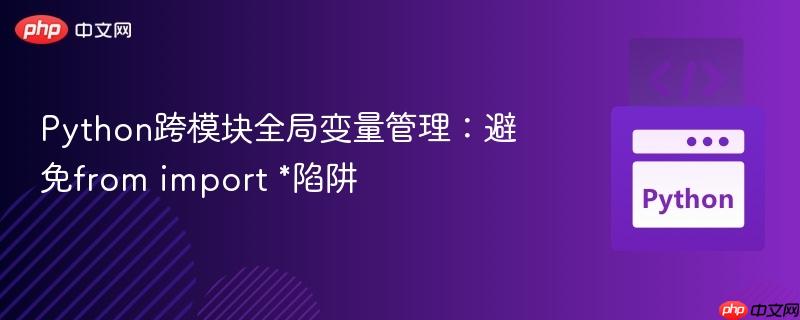
在python应用程序开发中,尤其是在pygame这类需要管理全局状态的场景下,跨模块共享和修改变量是常见的需求。然而,如果不理解python的模块导入机制,可能会遇到变量作用域不困惑,导致一个模块对“全局”变量的修改无法被其他模块感知。
Python中跨模块变量共享的挑战
设想一个场景:你有一个globals.py文件,其中定义了一个全局变量selectedSong = None。在playlist.py中,一个函数generatePlaylist根据用户交互更新selectedSong的值。随后,在buttonMusic.py中的playButton函数尝试使用这个selectedSong变量。然而,你发现尽管generatePlaylist函数内部打印显示selectedSong已更新,但在playButton函数中,selectedSong的值却始终为初始的None。
这种现象的根源在于Python的模块导入方式。
from module import * 的作用机制
当你使用from globals import *语句时,Python会将globals模块中所有可用的名称(包括变量、函数等)导入到当前模块的命名空间中。这意味着,selectedSong变量实际上被复制到了playlist.py模块的本地命名空间中。同样地,当buttonMusic.py也执行from globals import *时,它也会得到自己独立的selectedSong副本。
用伪代码解释:
立即学习“Python免费学习笔记(深入)”;
- globals.py:selectedSong变量在globals模块中存在。
- playlist.py:执行from globals import *后,playlist.py内部创建了一个名为selectedSong的新变量,并将其初始化为globals.selectedSong的当前值(None)。当playlist.py中的代码修改selectedSong时,它修改的是playlist.py自己的这个局部副本,而不是globals.py中原始的selectedSong。
- buttonMusic.py:同理,它也创建了自己的selectedSong副本,并且这个副本从未被playlist.py的修改所影响。
因此,每个模块都在操作自己的selectedSong副本,导致它们之间无法共享同一个变量状态。
正确的跨模块变量引用方法
要解决这个问题,你需要确保所有模块都引用和修改的是同一个selectedSong变量实例,即globals.py中定义的那个原始变量。实现这一目标的方法是使用import module语句,并通过module.variable的形式来访问变量。
当你使用import globals时,Python会将globals模块本身作为一个对象导入到当前模块的命名空间中。此时,如果你想访问globals.py中的selectedSong变量,你需要通过globals.selectedSong来引用它。
这样,无论哪个模块通过globals.selectedSong来访问或修改变量,它们操作的都是globals模块对象内部的那个唯一的selectedSong属性。
示例代码:修正后的实现
下面是根据上述原理修正后的代码示例:
1. globals.py (保持不变)
import pygame as Py selectedSong = None
2. playlist.py (修改导入和变量赋值方式)
import pygame as Py # 假设Pygame已导入
import globals # 导入整个globals模块
import os
# 假设 screen 变量在 Pygame 初始化后可用
# screen = Py.display.set_mode((800, 600))
songs = os.listdir('./assets/songs')
def generatePlaylist(font, event):
for index, song in enumerate(songs):
rectIndex = Py.Rect(20, 25 + (50 * (index + 1)), 260, 40)
rectIndexPosition = (20, 25 + (50 * (index + 1)))
rectIndexWidth = 260
rectIndexHeight = 40
Py.draw.rect(screen, 'gray', rectIndex) # 假设 screen 已定义
text_surface = font.render(song, True, (0, 0, 0))
text_rect = text_surface.get_rect(center=rectIndex.center)
screen.blit(text_surface, text_rect)
selected = selection(event, rectIndexPosition, rectIndexWidth, rectIndexHeight, song)
if selected is not None:
globals.selectedSong = selected # 使用 globals.selectedSong 引用和修改
print(f"Playlist: selectedSong updated to {globals.selectedSong}") # 打印确认
if index == len(songs) - 1:
# ... 其他绘制代码 ...
pass # 简化,省略不相关的绘制逻辑
def selection(event, rectIndexPosition, rectIndexWidth, rectIndexHeight, song):
if event.type == Py.MOUSEBUTTONUP:
if rectIndexPosition[0] <= event.pos[0] <= rectIndexPosition[0] + rectIndexWidth and \
rectIndexPosition[1] <= event.pos[1] <= rectIndexPosition[1] + rectIndexHeight:
return song
return None3. buttonMusic.py (修改导入和变量引用方式)
import globals # 导入整个globals模块
# from musicFunction import * # 假设 musicFunction 中的 play 函数需要导入
# 假设 imagePlayPosition 和 imagePlay 变量已在某处定义
# imagePlayPosition = (100, 100)
# imagePlay = Py.Surface((50, 50)) # 示例 Surface
def play():
# 假设 mx.music 模块和 load, play 函数已导入或定义
# import pygame.mixer as mx
# mx.music.load(f'./assets/songs/{globals.selectedSong}')
# mx.music.play()
print(f"Playing: {globals.selectedSong}") # 模拟播放
def playButton(event):
if event.type == Py.MOUSEBUTTONDOWN:
# 假设 imagePlayPosition 和 imagePlay 已定义并可访问
if imagePlayPosition[0] <= event.pos[0] <= imagePlayPosition[0] + imagePlay.get_width() and \
imagePlayPosition[1] <= event.pos[1] <= imagePlayPosition[1] + imagePlay.get_height():
print(f"ButtonMusic: current selectedSong is {globals.selectedSong}") # 打印确认
if globals.selectedSong is not None: # 使用 globals.selectedSong 引用
play()通过上述修改,playlist.py和buttonMusic.py都通过globals.selectedSong访问和修改了globals模块中同一个selectedSong变量,从而实现了预期的跨模块变量共享。
最佳实践与注意事项
- 避免过度使用全局变量:虽然全局变量在某些简单场景下很方便,但在大型或复杂的应用中,过度依赖全局变量会导致代码难以理解、测试和维护,因为它引入了隐式的依赖关系。
- 考虑使用类或数据结构:对于更复杂的应用程序状态管理,通常推荐使用类来封装相关的数据和行为。例如,可以创建一个StateManager类,其中包含selectedSong等状态变量,并通过实例化的方式在不同模块间传递和共享这个状态对象。
- 明确导入方式:始终清楚import module和from module import name之间的区别。前者导入模块本身,后者将特定名称导入到当前命名空间。在需要跨模块共享可变状态时,import module并使用module.name是更安全和明确的选择。
- 命名约定:为了区分全局变量,可以在globals.py中将变量命名为大写(例如SELECTED_SONG),这是一种常见的Python约定,用于表示常量或应视为全局的变量。
总结
理解Python的模块导入机制对于正确管理跨模块变量作用域至关重要。当需要多个模块共享和修改同一个全局变量时,应使用import module语句,并通过module.variable的形式来访问和操作该变量。这能确保所有模块都指向并修改同一个内存中的变量实例,从而避免因创建变量副本而导致的状态不同步问题。






























